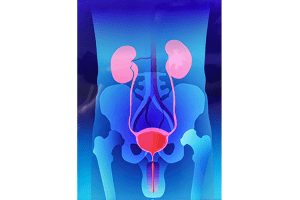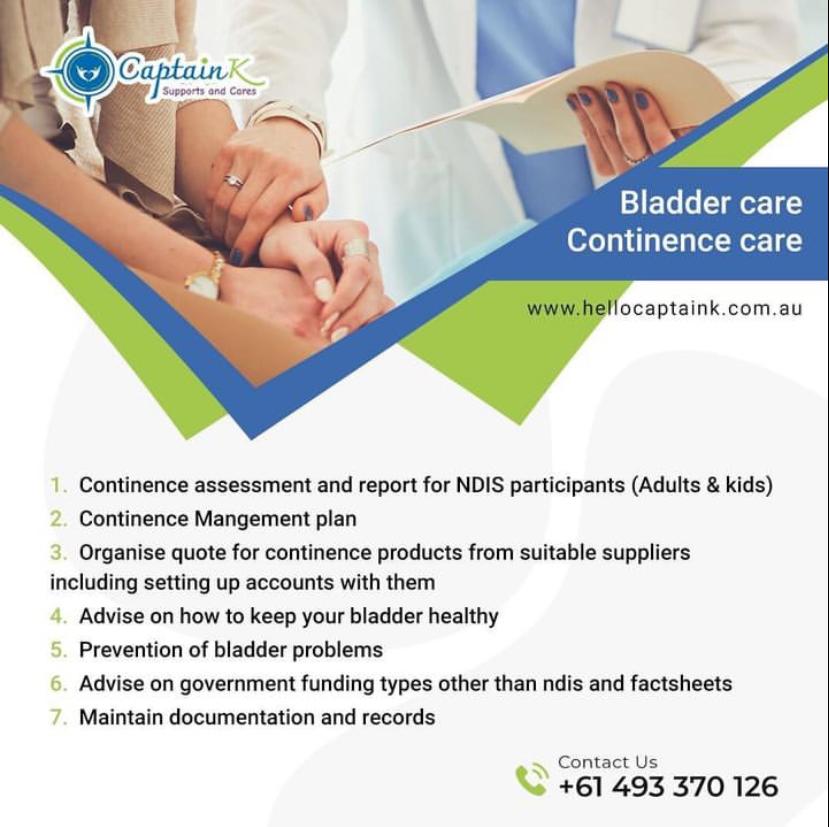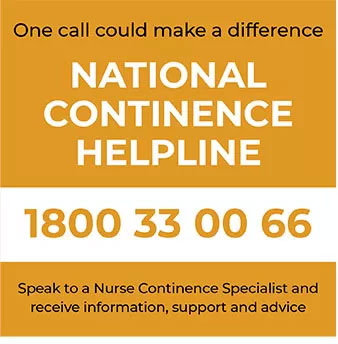NDIS Continence Assessment Services in Perth & Melbourne
What is continence assessment?
- Every 1 in 4 Australians are incontinent.
- Urinary incontinence affects up to 10% of Australian Men and 38% of Women.
- Faecal incontinence affects 6% of Australian men and 10% of women.
- As estimated 1.17 million Australians aged 65 and above living in community and aged care facilities were incontinent in 2010 as per Continence Foundation of Australia’s report statistics.
There are 2 types of bladder incontinence:
Urinary Incontinence:
- Urge incontinence
- Stress incontinence
- Urinary retention
- Functional incontinence

Faecal incontinence:
- long term straining
- medications, e.g. antibiotics, drugs for arthritis and diabetes
- lifestyle, e.g. heavy lifting leading to weak pelvic floor muscles
- weak back passage muscles due to having babies, getting older, some types of surgery, or radiation therapy
- bowel disease, e.g. Coeliac disease, Crohn’s disease
- nerve disorders resulting from Multiple Sclerosis and Parkinson’s
- diarrhoea
- constipation.

Questions Asked During Continence Assessments in Perth or Melbourne
- How often do you go to the toilet?
- How much urine (wee) do you pass?
- What do your bowel motions (poo) look like?
- How often and how much do you leak urine?
- What is your fluid and diet intake?
- What medications are you currently taking?
- Do you have any other health problems?
- Are you able to take yourself to the toilet, dress yourself and keep yourself clean?
- We offer Face 2 face, Online Telehealth via Teams, and Phone consultations.
- Our Telehealth and phone consultations are conducted Australia wide!

What else is included in the Continence assessment?
- Your continence nurse serving Melbourne or Perth will discuss your goals and what you like to achieve because of your assessment.
- Your continence nurse will ask lots of questions about you, your medical history, your bladder, and bowel issues.
- -After your appointment, your continence nurse will write a detailed report which will include recommendations, therapies, continence products and supports that will help you to achieve your goals.
- Your continence nurse may assist you with opening accounts with relevant consumable providers.
- A minimum of 5-6 hours is required for a proper assessment, detailed report and continence product quote prescription. If your needs are complex or travel is necessary, additional hours up to 10 may be required.
KEY STATISTICS AS OBTAINED FROM Continence Foundation of Australia
Incontinence in Australia
- Over 5 million Australians – 1 in 4 people aged 15 years or over – experience bladder or bowel control problems. This number is predicted to grow to 6.5 million by 2030.
- 80% of people with urinary incontinence are women.
- 1 in 3 women who ever had a baby wet themselves.
- Strong pelvic floor muscles are necessary for bladder and bowel control and good sexual function.
- Pelvic floor muscle exercises have been shown to prevent and treat incontinence at any age.
- Less than 2 out of 10 women (17.6%) do their pelvic floor exercises daily.
- 70% of incontinent people do not seek help.
- Bladder and bowel control problems are not a natural part of ageing or having a baby.
- Incontinence can have long-term physical and emotional impact, affecting self-esteem, motivation, and independence.
Continence and the NDIS
Continence Assessment in Perth & Melbourne is funded by the NDIS under Capacity building, Improved Daily Living skills and it should be included in your plan during your meeting with NDIS if you feel it is required.
NDIS divides AT continence products into 4 levels of funding based on the complexity of need.
Category 1: Basic low cost and low risk ready-to-use items
Category 2: Standard ‘Off the shelf items.’’ A continence nurse assessment may be needed to help initially select which product to use.
Category 3: Specialised or modified ‘’off the shelf’’ items. These items require an assessment.
Category 4: Custom or uniquely configured items. These items require an assessment.
How can I use my NDIS funding to pay for continence products?
There are several ways you can manage your NDIS funding.
Self-managed supports:
- The participant pays the invoice and claims reimbursement from the NDIA.
- Items can be purchased from both registered and non-registered providers.
Plan managed supports:
- Participants can purchase from both registered and non-registered providers local or online stores.
Agency managed supports:
- Participants MUST purchase from a registered provider.
- The registered providers do the online booking on my place portal to claim the payment for the products quoted.

